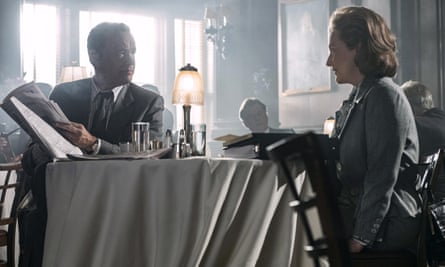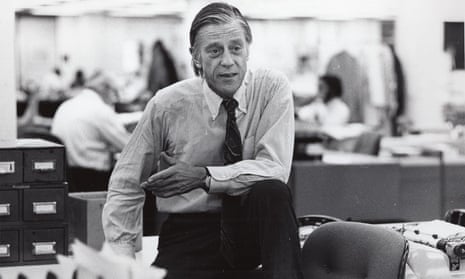A new HBO documentary plays tapes of the president telling his press secretary not to let any Washington Post reporters into the White House from now on, saying: “That’s a total order and, if necessary, I will fire you.”
He goes on to call the newspaper’s editor “a mean bastard”, while the press secretary decries its latest articles as “shoddy journalism”.
Just another day in DC? Kind of.
The president in question is not Donald Trump, it’s Richard Nixon, the press secretary is Ron Ziegler, the editor is Ben Bradlee and the articles concerned Watergate.
Nevertheless, “it’s deja vu,” said John Maggio, director of the documentary, The Newspaperman: The Life and Times of Ben Bradlee. “The parallels are astonishing to me.”
Maggio had no idea what was around the corner when he started making the film in the summer of 2016, in the heat of the presidential election and two years after Bradlee died in 2014 at 93.
“I assumed Hillary Clinton was going to win,” said Maggio.
Then Trump became president and his frequent and personalized railing against much of the mainstream media descended into outright feud.
Now Trump’s former national security adviser, Michael Flynn, has admitted lying to the FBI and is cooperating with the special investigation into who from the Trump administration and election campaign may have had links with the Russian government.
Three days after Flynn appeared in court, Maggio’s documentary will replay scenes of senior Nixon officials facing the music in the political corruption scandal that brought down the president in 1974.
“Nixon turned the press into the enemy. Watching Trump it’s like, page for page, the Nixon playbook,” Maggio told the Guardian.
The documentary is also a reminder that the Watergate catastrophe took two years to play out. Even after the Washington Post had many scoops exposing ever more of the conspiracy and cover-up jigsaw, Nixon won a re-election landslide in 1972.
The Newspaperman describes Nixon’s “vendetta” against the Post and plays a tape of Nixon’s right-hand man, Henry Kissinger, saying: “This Ben Bradlee is a tough, mean cynic.” The president is heard concurring that the editor is “a mean bastard”, and later calls the Post’s reporting “outrageous, distorted” and “hysterical”.
But Bradlee’s third wife, Sally Quinn, told the Guardian: “He never went after Nixon personally, it wasn’t personal for Ben.”
Bradlee’s voice is heard throughout the documentary reading the audio version of his memoir.
“The air was thick with lies and the president was the chief liar,” says Bradlee’s voiceover, of Nixon.
Quinn’s favorite adjective for Bradlee is “swashbuckling”. Senior journalists describe him as fearless. His sense of invincibility was forged while battling to recover from polio as a teenager, then serving as a young officer in the South Pacific during the second world war.
A documentary about a newspaper editor always risks boring viewers with journalism’s equivalent of inside baseball, no matter his charisma and track record.
But not when this is the real life version of Hollywood’s All the President’s Men, which dramatized the Post’s exposure of the Watergate debacle and made Bradlee, as the documentary says, the “first celebrity editor”.
And the early part of the film is filled with sumptuous archive footage of Bradlee and his second wife Antoinette, AKA Tony, hanging out socially with John and Jackie Kennedy.
Riveting shots show the handsome four larking around on golf carts and sipping summer cocktails on yachts in the blue, blue waters off New England.
It’s always undeniably mesmerizing to watch the unwitting JFK, us knowing that his mischievous grin and magnetism are about to be snuffed out with his 1963 assassination.
Here, there’s extra fascination, also unsettling, as your attention is drawn away from the electric Kennedys to Ben and Tony, right by their side. Bradlee worked for Newsweek at the time but ended up in JFK’s inner, inner circle, where the line between friend and journalist blurred. Ben and Tony would dine at the White House and Bradlee would sometimes fly with the president.
“It was inappropriate and he was driving his Time competitors crazy,” NBC veteran Tom Brokaw comments.
Tina Brown, former New Yorker, Vanity Fair and Daily Beast editor, says of JFK and Bradlee, both sons of Boston: “They were brothers in style. If Ben Bradlee had been a politician he would have been a Kennedy.”
The film charts Bradlee’s discovery of his wild side as a glamorous foreign correspondent for Newsweek in Paris in the 50s.
Over footage of skiing in the Alps and gossipy parties, Bradlee unabashedly describes cheating on his first wife, then leaving her, acting with “recklessness and thoughtlessness” and causing misery for his seven-year-old son.
“I don’t think he’s ever had a moment of guilt in his life, honestly,” says Sally Quinn on camera.
When publisher Katherine Graham appointed Bradlee executive editor of the Washington Post in 1968, “it was a second-rate provincial newspaper,” veteran Washington Post journalist Robert Kaiser says in the film. Bradlee began turning it into a national contender.
But he reveals being sick to his stomach when the pre-eminent New York Times beat him with its Pentagon Papers mega-scoop in 1971 – thousands of leaked classified documents showing the government had lied about how badly the Vietnam war was going in the mid-60s, and covering up bombing campaigns in Cambodia and Laos.
After the government won an injunction to block further publication on the grounds of national security, Bradlee and Graham, against legal advice, went to court and triumphed in a landmark supreme court victory for freedom of the press under the first amendment. Stills in the film show the two practically jumping for joy as they can begin publishing new excerpts in their newspaper.
“National security wasn’t the issue, national embarrassment was the issue!” PBS journalist Jim Lehrer scoffs at the White House.

A Steven Spielberg dramatization of the battle, called The Post, hits the big screen in December.
“The first amendment was Ben’s religion,” Quinn said.
The documentary cites the Pentagon Papers triumph in the emboldening of the Post team that later doggedly and audaciously pursued their Watergate coverage, while other papers held back and the White House exerted ferocious pressure. Star reporters Bob Woodward and Carl Bernstein reminisce fondly about the irascible Bradlee’s habitual yelling and profanity as he drove them onward.
But the film also alludes to hubris at the paper in the years that followed, which ultimately contributed to the fiasco of the Post publishing a fake story about a child heroin addict. Upon discovering it had been duped by its own reporter, the Post handed back the 1981 Pulitzer Prize. Bradlee then made the unconventional decision to publish a forensic, 18,000-word mea culpa and analysis of the catastrophe.
“This became the template for what you do when you screw up,” says New Yorker editor David Remnick.
Bradlee retired from the Washington Post in 1991, which seems an awfully long time ago now. Yet his battles are still being fought in principle, and his mantras are evergreen.
With Bradlee under siege over Watergate, he says, simply: “We hunker down and go about our business, which is not to be loved but to go after the truth.”
Deja vu.
- The Newspaperman: The Life and Times of Ben Bradlee airs on HBO on 4 December at 8pm
